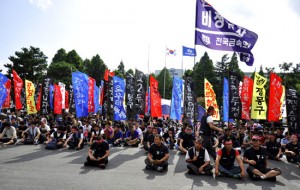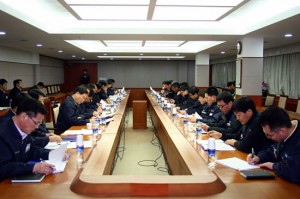The Significance and Prospects of the Hyundai Motor Irregular Workers
In house Subcontactors, Illegal Dispatch
Roughly 40,000 directly employed regular workers and 10,000 irregular in)house subcontracted workers work for the Hyundai Motor Company. The in)house subcontracted workers, who do the same work as regular workers inside Hyundai Motor plants, but are formally employed by other companies, are in fact no different from temp agency or ‘dispatch’ workers. Under South Korean law, dispatch employment is prohibited in the manufacturing sector. By law, therefore, Hyundai Motor should directly employ and ‘regularize’ these workers. Hyundai Motor management, however continued to refuse the regularization of the irregular worker in its factories.
In 2003, Hyundai Motor irregular workers formed their own union and have since fought to win regularization and the abolition of illegal dispatch employment. Currently, irregular worker union chapters affiliated to the Korean Metal Workers’ Union (KMWU) exist at the Hyundai Motor plants in Ulsan, Asan and Jeonju.
Hyundai Motor’s Obstinacy
In 2004, the Ministry of Labor found that 127 in)house subcontractors employing 9,234 workers at Hyundai plants were in fact illegal dispatch agencies. Energizes by this ruling, the Hyundai irregular workers struggle moved forward with full force. This struggle involved the occupation of Factory 5 at the Hyundai Plant in Ulsan, the self)immolation of one worker and the self)hanging of another, and yet the company did not waiver in its position.
In 2010, a historic Supreme Court decision found that Hyundai Motor irregular worker Byeong)seung Choe was an illegally dispatched worker and should, therefore, be regularized. Still, Hyundai management refused to budge, calling the verdict “not the final decision” and even going so far as to make a second appeal to the Supreme Court. In response, the Hyundai irregular workers occupied Factory 1 of the Ulsan Plant from November 15 to November 25, 2010 demanding regularization. At this time, irregular worker In)hwa Hwang also set himself on fire in protest.
Hyundai Motor’s efforts to crush the irregular workers’ struggle have been extreme. Over the last ten years some 200 workers have been fired and the company has made claims for damages and provisional seizure of assets against union members worth several billion won (several million dollars). It has also sent managers and hired thugs to violently suppress protests.
The Legal Basis for Regularization
Finally, in February of this year the Supreme Court issued its final verdict finding that “Hyundai Motor has the responsibility to directly hire union member Byeong)seung Choe, given that he is indeed an illegally dispatched worker.” Hyundai, however, refused to follow the Supreme Court’s decision, claiming “because Byeong)seung Choe has been dismissed, the company has no obligation to rehire him,” and filing a complaint with the National Labor Relations Commission (NLRC). The NLRC found that Choe had been unfairly dismissed, but Hyundai has not rehired him, nor has it regularized any other in)house subcontracted workers.
The main content of the Supreme Court decision is as follows: “Due to the particular characteristics of Hyundai Motor’s automated)flow production method, which uses a conveyer system, the various steps of the manufacturing and assembly process must be carried out continuously without stop and, thus, cannot be independent. Given the fact that the in)house subcontractors in fact dispatch their workers to Hyundai Motor and that these workers are directed and supervised by Hyundai Motor, the contract between the in)house subcontractors and Hyundai Motor falls in the category of a contract for dispatch labor.” Thus, the Supreme Court recognized in)house subcontracting as illegal dispatch.
In addition, an amendment to the Act on the Protection, Etc. of Temporary Agency Workers, which went into effect on August 2, 2012, stipulates that in cases where illegally dispatched work is verified, the parent company must directly employ the related workers even if they have only worked for a single day. The Ministry of Labor and Supreme Court decisions, the new revision of the Temporary Agency Worker Act and the general state of public opinion are all highly disadvantageous to Hyundai Motor.
The Deceitful Proposal of 3,000 New Hires
Given this situation, Hyundai Motor finally put forward a proposal to directly hire 3,000 of its in)house subcontracted workers as new employees by 2016. 3,000 hires, however, is far less than the full number of in)house subcontracted workers. Moreover, 2,800 regular Hyundai workers are scheduled to retire by 2016. This means that Hyundai Motor’s proposal amounts to little more than filling the slots vacated by retiring regular workers with some of the irregular workers, excluding those who have been dismissed. The slots left open by the irregular workers who become directly employed would simply be filled by more in)house subcontracted workers. In other words, Hyundai Motor’s proposal amounts, not to the regularization of irregular jobs, but the passing of irregular jobs from one set of workers to another. It is Hyundai Motor’s plan to change the role of in)house subcontracted workers so that they will not qualify as dispatch workers by the above definition and, thus, free itself of the debate on illegal dispatch.
At the same time, Hyundai Motor has carried out a campaign of terror against the irregular workers. In one recent incident, managers and hired thugs beat and kidnapped officers of the KMWU Hyundai Motor Irregular Workers Branch, later leaving them outside factory grounds. The irregular workers’ struggle has continued in the face of these hardships, receiving considerable solidarity from unions around the country who have gathered in front of the Ulsan plant to hold solidarity protests.
Seeds of Division
Meeting with the irregular workers’ union through the ‘Parent Company)Subcontractor Workers Alliance’, the regular workers union made a promise to work collectively to achieve the regularization of the Hyundai irregular workers. Last April, the Alliance put forth the following six demands: 1) regularization of all irregular workers employed by in)house subcontractors; 2) immediate withdrawal of all charges, arrest warrants, dismissals, claims for damages and provisional seize of assets against in)house subcontracted workers in relation to their struggle; 3) a public apology for the illegal acts and repression against the irregular workers; 4) an agreement between labor and management to discontinue any further use of irregular workers, 5) an immediate end to structural adjustment related to irregular workers, and 6) adherence to labor laws with regards to the three irregular workers’ union chapters and non)interference in union activities.
In fact, however, the regular workers union has come under heavy criticism failing to stick by these demands. Engaged with Hyundai management around its own collective bargaining, the regular workers union accepted the proposal for 3,000 new hires. It even carried out a campaign to convince the irregular workers to go along with the proposal, leading to divisions among the irregular workers. Worrying that if they persist in struggle they might not even win fulfillment of the promise of 3000 new hires, and some members have left the irregular workers union.
Given this situation, the irregular workers union demanded that the issue of irregular worker regularization be taken out of the irregular workers union’s collective bargaining and dealt with in a special negotiation session. Towards the end of August, it also adopted a new policy of “winning regularization for members who stick with the struggle first.” The proclamation of this policy was an effort to remobilize, yet it marks a retreat from the principle of “regularization of all in)house subcontracted workers.”
Results of the Regular Workers Union’s Collective Bargaining
On August 29, the Hyundai regular workers union reached an agreement in its collective bargaining with Hyundai without settling the issue of the irregular workers. The content of the agreement is as follows: 1) An increase in basic wages by 98,000 won, a bonus of 350% of basic wages plus 9 million won and an incentive bonus of 150% plus 600,000 won (including a 100,000 won tradition market gift certificate), for a total increase of 27 million won per person; 2) a two)week trial of the two daytime shift system (replacing late night work), beginning on January 1, 2013 and full implementation at all plants based on one 8)hour and one 9)hour shift. The issue of regularizing irregular workers was deferred to a future special negotiation session.
In the bargaining session that took place beginning at 5:00pm on August 29, 4 members of the union bargaining committee walked out in protest against the company’s proposal. That night, the 4 bargaining committee members and some 50 Hyundai Motor Branch delegates and activists held a protest in front of the factory opposing the agreement, which lasted until roughly 12:00am. Their criticisms focus on the fact that the agreement failed to include a provision for an increase in employees to accompany the implementation of the two daytime shift system, meaning an increase in work intensity, and the fact that the bargaining committee had agreed to the belated reinstatement of fired workers in the first quarter of next year. The results of the union vote on the agreement reflected this atmosphere of discontent. The agreement barely past with a vote of 52.7% in favor.
Hyundai Motor’s profits in 2011 were 4.8 trillion won ($4.2 billion) a 36% increase over profits in 2010 (3.5 trillion won). Nonetheless, company management has maintained its position that, while it might give a bit more to regular workers, it will never regularize irregular workers. By so doing, it has succeeded in creating division between the regular and irregular workers. Despite the agreement to revisit the irregular worker question in special negotiations, hopes are not high that the regular workers union will give the needed support to the irregular workers’ struggle now that their collective bargaining agreement has been reached.
Future Prospects
The irregular workers union must now regroup and preparing for the special negotiations. To do so, the union must succeed in re)energizing its members to struggle and beat back company repression. It must also find a way to build common cause with active members of the regular workers union. Currently, the irregular workers union is planning a new struggle for the end of September and beginning of October. In the end, the struggle of Hyundai irregular workers, is the struggle of all in)house subcontracted workers South Korea. The solidarity of the labor movement and all progressive forces is, therefore, absolutely essential.

